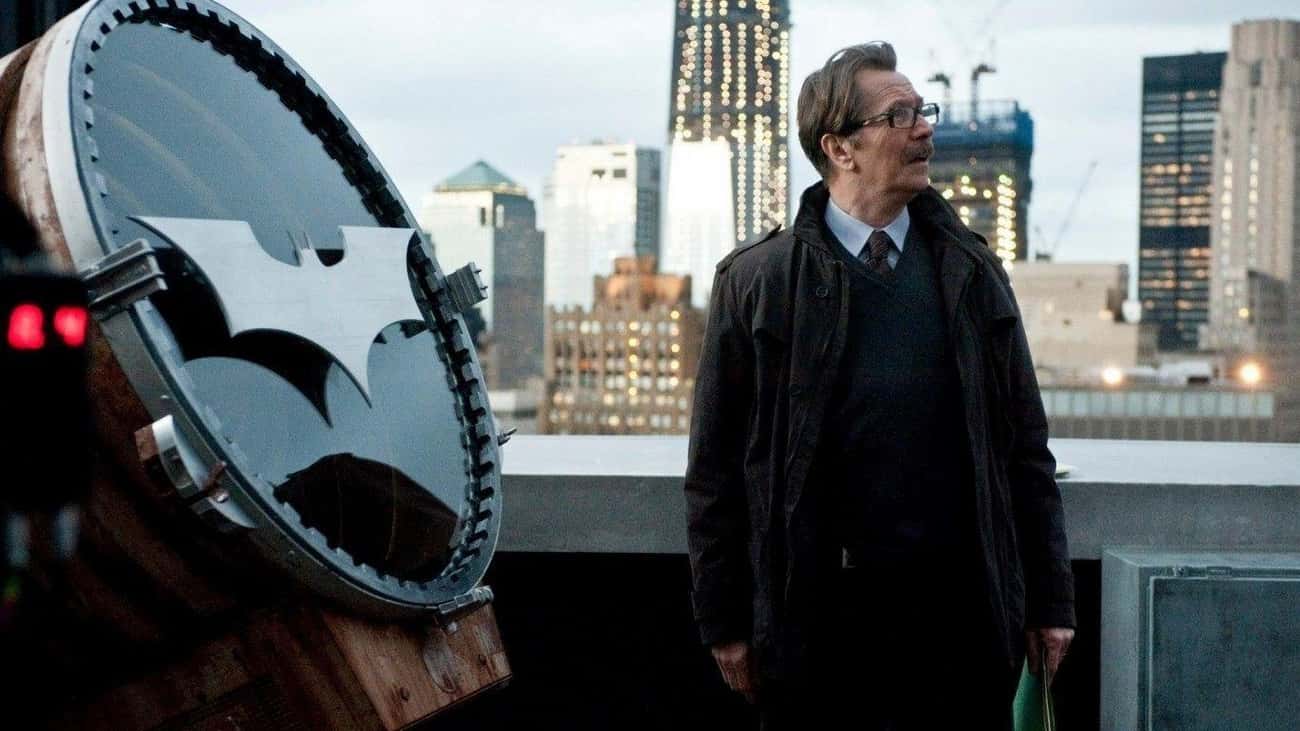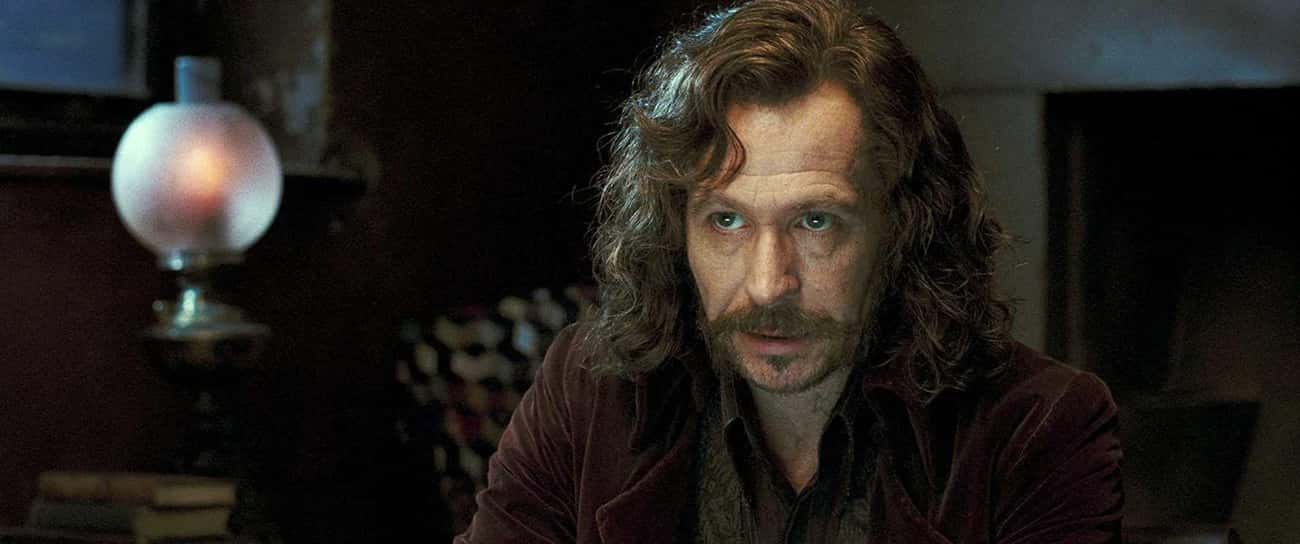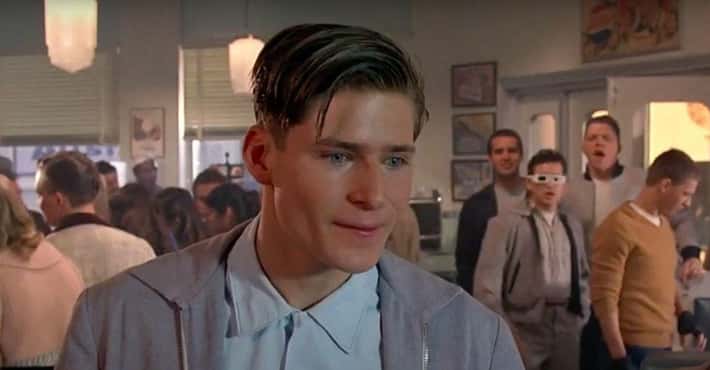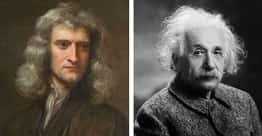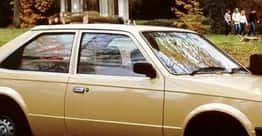19 Performances That Prove Gary Oldman Is Hollywood’s Greatest Shapeshifter
- Photo: The Dark Knight / Warner Bros. Pictures
One of the reasons the Dark Knight trilogy works so masterfully is that director Christopher Nolan understood a lot of fundamental truths about Batman and his world that are easy to overlook. One of those truths is that Batman requires a strong Commissioner Jim Gordon. The idea of a costumed vigilante only makes its proper impact when contrasted with a good old-fashioned legitimate lawman.
That meant casting an actor with a strong presence and an ability to convey moral decency. Nolan found his man, perhaps surprisingly, in Oldman. His Gordon is stoic and shrewd, knowing that vigilantism is not necessarily the best solution to the crime that plagues Gotham, while also recognizing that it can be mighty helpful. Because Oldman nails that balance, the actions of Christian Bale's Batman have a stronger resonance.
The Dark Knight films are unique in Oldman's career in that they represent one of the few times he played an undeniably honorable character.
- Photo: Columbia Pictures
Bram Stoker's Dracula came relatively early in Oldman's career, and it established him as an actor who delves deep into character. The film, directed by Francis Ford Coppola, finds him in pasty white old-age makeup, his hair in a weird heart-shaped design. That's for the aged Dracula. Other scenes show him as a younger vampire, decked out in a black top hat and dark sunglasses to match his long dark hair. It's amazing that such wildly different versions can be played by the same guy.
Beyond that, Oldman gives audiences a different kind of Dracula. His interest isn't so much in sucking blood, but in finding true love. Mina Harker (Winona Ryder), who resembles his late wife, is the woman he has his eye on. The actor uses his physical appearance to suggest the character's enigmatic qualities, but he similarly uses his voice to great effect. Writing for The Washington Post, critic Hal Hinson noted, "The dexterity and snaky complexity of his line readings is both awesome and inviting."
- Photo: Columbia Pictures
Leon: The Professional is best known for the breakout performance from then 12-year-old Natalie Portman. She may have stolen the show, but Oldman was nevertheless highly memorable as Stansfield, a psycho DEA agent looking to eliminate Portman's character. A rather aggressive DEA agent, for that matter.
Playing a guy evil enough to want to take out a child is something a lot of actors would avoid because of the discomfort of appearing so deeply unsympathetic. Oldman went the opposite direction, leaning into the idea of creating a character so deliciously mean that we can't wait to see him get his comeuppance. This is also the role that turned Oldman into a meme. The manner in which Stansfield screams at a henchman that he wants "EV-ERY-ONE!" brought to him has become an internet favorite.
- Photo: Columbia Pictures
Several years ago, Oldman publicly disowned The Fifth Element. Many science fiction fans don't share his dislike of the picture. Often described as a "good bad movie," there's so much bonkers stuff happening that it's hard not to be entertained. It's definitely a film like no other.
Oldman plays the movie's villain, Jean-Baptiste Emmanuel Zorg. He has a suitably unusual look here. One side of Zorg's head is shaved, and long hair combed over to the side covers the rest. To play such an odd bad guy, the star opted for an odd approach. SFX's Susan Arendt put it best, writing, "Zorg could've been a simple cartoon, either an over-the-top force of Evil with a capital E, or a sniveling underling to the real enemy of the film, Mr. Shadow. Gary Oldman makes him a bit of both and something more, a man who's both casually ruthless and utterly terrified."
In other words, Oldman makes this character megalomaniacal in a way that's not obvious, choosing instead to find a more distinct way of conveying Zorg's menace. It's a perfect example of the creativity that has made him an in-demand performer.
- Photo: Harry Potter and the Order of the Phoenix / Warner Bros. Pictures
In the Harry Potter franchise, Oldman plays Sirius Black, an escaped prisoner who initially seems like an antagonist to the title character and his friends, but ultimately turns out to be an ally in the fight against Voldemort. He makes his first appearance in Harry Potter and the Prisoner of Azkaban, which marked a turning point in his career.
Audiences were used to seeing the actor as a villain, given how frequently he'd played such roles in the past. At the same time, Oldman and the filmmakers knew the arc Sirius Black would take - one that would defy viewer expectations by revealing a heroic side. He made the character's transition from hiss-worthy baddie to faithful cohort so credible that it transformed his entire career. Oldman suddenly became a reliable franchise star, a guy who could bring gravitas to a beloved property.
- 6664 VOTESPhoto: MGM
In Hannibal, the sequel to The Silence of the Lambs, Oldman took an uncredited role as Mason Verger, the only person to have survived an attack by the notorious Hannibal "the Cannibal" Lecter. He now wants revenge against the psychotic shrink, and he's got one impressively devious plan to achieve it.
Keeping his name off the picture was an intriguing move. Verger is facially disfigured because of Lecter, so Oldman is virtually unrecognizable underneath a ton of prosthetics and makeup. That creates an aura of mystery around the character. Something about him seems familiar, yet it's hard to place who's portraying him if you don't already know. Oldman seemed to realize that this mystery would add something to the film. Whether you can identify him or not, the actor brings his famous intensity, creating a figure who possesses a very unique brand of maliciousness. We believe the violent Lecter might really be in danger from this guy. Given the iconic stature of Hopkins-as-Hannibal, that's a major accomplishment.
- Photo: Focus Features
Oldman won the Academy Award for Best Actor for his work in 2018's Darkest Hour. Buried under prosthetics, he plays Winston Churchill in this dramatization of how the former prime minister resisted calls to negotiate with Hitler, instead crafting a series of speeches designed to earn the public's support in standing firm against him. It's astonishing how much the makeup work makes the actor look like Churchill. In fact, if you didn't know who was playing the role in advance, you might not even realize it was Oldman.
If a good prosthetic job was all there was to the performance, though, it wouldn't have won anything, much less an Oscar. At that stage of his career, Oldman had become a widely respected showbiz veteran, appreciated for his ability to tackle larger-than-life characters. And who was more larger than life than Churchill? Darkest Hour needed a star who could both disappear into character and convey the historical figure's commanding presence. The list of viable candidates was small. Oldman was literally one of the few who could have pulled it off.
It's a cliche to say something "brings history alive," but his electrifying turn as the transformative WWII figure does just that.
- Photo: Warner Bros. Pictures
What a coincidence. The Book of Eli takes place in a post-apocalyptic world where hero Eli (Denzel Washington) has the last remaining copy of the Bible, and villain Carnegie (Oldman) just happens to be looking for one. His reason for wanting a Bible isn't religious, though. Carnegie, who controls a steady supply of fresh water, believes that having the holy book will help him consolidate the immense power he already wields.
Oldman has played villains regularly throughout his career, but this one is a little different. For starters, he doesn't radically alter his appearance to play Carnegie. Also worth noting is that part of his primary function within the story is to hold his own against Denzel Washington. When the lead actor is as magnetic as Washington, an antagonist of equal magnetism is crucial. Oldman skillfully pulls this off, making the post-apocalyptic warlord a suitably demonic force to clash against holy man Eli.
- Photo: Columbia Pictures
Harrison Ford is a formidable onscreen presence who was still at the top of his game in the late '90s. His action hit Air Force One - in which the president's airplane is hijacked by terrorists - needed someone equally formidable to play the villain. After all, the audience knows the heroic Ford is going to triumph in the end, so there's got to be a bad guy who at least feels like a viable threat.
Having played bad guys multiple times before, Oldman had just the right qualities. He adapted his now-trademark intensity to work within the bounds of a mainstream blockbuster. Adding to that, he gives his character, Ivan Korshunov, a certain suaveness, not unlike what Hans Gruber had in Die Hard. The end result was that he made Korshunov vile enough that viewers cheer when Ford literally jettisons him out of the airplane, thousands of feet in the air.
- 10400 VOTESPhoto: Warner Bros. Pictures
You may not agree with Oliver Stone's conclusion that the military-industrial complex was behind the assassination of John F. Kennedy, but he certainly makes a compelling argument that Lee Harvey Oswald could not have been the lone culprit. The filmmaker's epic 1991 drama JFK casts Oldman as Oswald, who famously insisted he was just "a patsy" framed for the act.
Once the actor had his hair cut and was in costume, he bore a strong resemblance to Oswald. Most of what the public saw of this notable figure was his famous denial and the even more famous footage of nightclub owner Jack Ruby gunning him down. Oswald is not the main character in JFK - that would be Jim Garrison (Kevin Costner) - but he is a vital character. Oldman invests him with a squirrelly quality that helps sell the film's underlying idea that he really wasn't bright enough to pull off the sinister act by himself.
JFK was the actor's first true box office hit, subsequently raising his profile to a significant degree.
- 11539 VOTESPhoto: The Samuel Goldwyn Company
Alex Cox's Sid and Nancy was Oldman's second film, his first as a lead, and absolutely the movie that put him on the map. He was tasked with playing Sid Vicious, the bassist for punk rock band the Sex Pistols. Aside from being an important influencer in the punk movement, Vicious was notable for having a heavy substance dependency that eventually cost him his life. The movie looks at the dysfunctional codependent relationship between Vicious and his fellow-user girlfriend Nancy Spungen (Chloe Webb) - a relationship that ended when he allegedly fatally attacked her.
Obviously, Sid Vicious was a deeply troubled individual. Rather than merely imitating him, though, Oldman truly embodied the punk legend, capturing the anarchy inside. There's a palpable sense of danger in his performance. We aren't just watching an actor in a role - we're watching an unpredictable young man on a whirlwind path of destruction. Sid and Nancy works so well in large part because Oldman makes the portrait of a person allowing himself to get sucked down the drain feel all too real.
- Photo: Focus Features
The 2011 adaptation of John le Carre's Tinker Tailor Soldier Spy is a fascinating anomaly in Oldman's career. He plays George Smiley, a retired intelligence agent brought back to MI6 to help ferret out a double agent working for the Soviets. The role earned him his first Oscar nomination.
Typically, the actor has been cast in roles that call for him to be bold, outrageous, dangerous, or any combination of those elements. Here, it's the exact opposite. Smiley is older and kind of weary from his years in the spy business. He has a tendency to listen and contemplate. He doesn't say a whole lot, but when he does, it's spot-on. Unsurprisingly, Oldman is phenomenal. He could not have played this part earlier in his career. His firm entrenchment as a cinematic power player informs his work, helping turn Smiley into a seasoned expert who commands the room, whether speaking or silent.
- 13440 VOTESPhoto: Warner Bros. Pictures
An actor has to reach a certain level of prestige to earn the chance to do a show-stopping single-scene cameo in a big movie. By 1993, Oldman was widely respected for his talent and unconventional performance choices, so he got a chance to deliver one of those one-sceners in Tony Scott's True Romance. He plays Drexl Spivey, a pimp confronted by hero Clarence (Christian Slater). Clarence wants his girlfriend Alabama (Patricia Arquette) free of the gangster's grasp.
Oldman decided to take Drexl in an idiosyncratic direction. He's got conspicuous facial scars, dreadlocks, and a personality that's, shall we say, clearly an affectation. Those qualities can sound comical on page, and indeed there is a darkly humorous vibe to the character. However, the unexpected sight of Oldman looking and sounding that way onscreen generates a certain sense of dread. We might be inclined to snicker the first time we encounter him, but after a couple of seconds, we realize this guy is a true threat.
- Photo: 20th Century Fox
Dawn of the Planet of the Apes, the second film in the recent trilogy, builds on the franchise's themes, among them man vs. man's own creation (i.e, hyper-intelligent apes). Much of the film is about the efforts of Malcolm (Jason Clarke) to negotiate peace with the apes so that he and his fellow surviving humans can repair a dam that will give them electricity. There is, however, one holdout. Dreyfus (Oldman) blames the apes for spreading the virus that eliminated his family and many others. He has zero interest in a truce, preferring to take down the apes by any means necessary.
Oldman's turn as Dreyfus once again demonstrates how the esteem he's built up can transfer nicely to blockbuster franchises. The movie doesn't have time to introduce a lot of characters who oppose the apes. It needs one person to fully represent that idea and make it register. Oldman expertly accomplishes that, using the full force of his charismatic presence to show the resentment that festers inside of Dreyfus - a resentment that puts everyone else in danger because it threatens to destroy any attempts at peace.
- 15237 VOTES
'The Contender' - The Grandstanding Politician
Photo: DreamWorks PicturesWe all know that politics is a dirty business. Oldman brought that to life vividly in Rod Lurie's 2000 drama The Contender. When the vice president passes unexpectedly, the president (Jeff Bridges) has to pick a new one. He chooses Senator Laine Hanson, played by Joan Allen. Oldman is Shelly Runyon, a congressman determined to oppose her appointment. He's even willing to stoop to the level of exploiting an incident from Hanson's past in order to smear her.
Oldman's look in the film once more proves what a chameleon he is. Shelly is partly bald, with curly hair on the sides and in back, and a pair of dorky glasses resting uncomfortably on his face. The look accentuates the character's grandstanding nature, as well as his willingness to sling mud. It might all seem a little excessive were we not aware that Oldman is perfectly nailing the slimy personality of many famous politicians. The role gave him a chance to play a more realistic kind of antagonist than those he'd played previously.
- 16245 VOTES
'Prick Up Your Ears' - The Doomed Playwright
Photo: The Samuel Goldwyn CompanyStephen Frears's Prick Up Your Ears is based on the true story of playwright Joe Orton. Oldman tackles that role, while Alfred Molina plays Orton's partner Kenneth Halliwell, who resents being pushed into the background while his boyfriend is repeatedly lauded. There's an element of danger to their relationship, as Orton almost seems to enjoy taunting him. Eventually, Halliwell reaches his boiling point, bashing Orton in the head with a hammer before swallowing a handful of pills.
Oldman does a phenomenal job showing how Orton flaunts his sexuality in 1960s Britain, when homosexual activity was still illegal. He also suggests a perverse thrill that comes from knowing he can get a reaction out of Halliwell, despite obviously loving him passionately. Catherine Pearson of Little White Lies praised his performance, writing that Oldman "not only nails Orton's voice and mannerisms but imbues the character with an anarchic spirit which those closest to Orton remember fondly."
Coming a year after Sid and Nancy, Prick Up Your Ears was part of an astounding one-two punch that announced to the world that an edgy young actor was on the scene.
- Photo: Netflix
Oldman has often played real people onscreen, as he did in the Netflix drama Mank. Here, he’s sharp-tongued screenwriter Herman J. Mankiewicz, the man who co-wrote Citizen Kane with Orson Welles. The film, directed by David Fincher, looks at his life, career, and alcohol problem. It also offers a detailed portrait of old Hollywood.
The actor’s task here is challenging because Fincher shoots Mank to resemble a motion picture from the 1930s and early 1940s. The tone is heightened, including the style of performance. Oldman manages to meet that style while still finding the depth in the Mankiewicz character. He offers a magnificently detailed turn as a man whose personal demons drove his brilliant art and vice versa. Even more impressively, he conveys the weariness Mankiewicz feels trying to wrangle a screenplay as complex as Kane's with a director known for his own complexity.
- Photo: Sony Pictures Releasing
Gary Oldman is probably the only living actor who could credibly play Sid Vicious and Ludwig van Beethoven. He does the latter in Immortal Beloved. The plot is kicked off by a letter Beethoven wrote to an unnamed woman, professing his true and unwavering love. His assistant Schindler (Jeroen Krabbé) discovers that letter after his passing and sets out to determine the mystery woman’s identity.
The rest of the movie is flashbacks showing how the young composer developed his music, lost his hearing, and evolved into a troubled genius. His relationships with women are also portrayed. Oldman is typically exquisite, precisely capturing the intense emotions that undoubtedly fueled Beethoven as both a human being and a musician. The intensity he brings to the role is fitting for a man who gave the world such impassioned compositions. He makes you feel the inner turmoil that drove the real-life figure he’s portraying.
- Photo: Warner Bros. Pictures
It’s a pleasant surprise when Gary Oldman shows up toward the end of Oppenheimer, playing Harry Truman. Of course, it might take you a moment to realize who you’re seeing, because Oldman would never call attention to himself that way. He’s made up to be a virtual dead ringer for the former president. From there, he immediately grabs you with the force of his performance which, while brief, is totally memorable.
At this point in the film, Robert Oppenheimer (Cillian Murphy) feels guilt that the atomic bomb project he spearheaded was used to kill thousands of people in Japan. Oldman is tasked with consoling him in a way that also makes a provocative point for the audience. Truman advises that history will remember who ordered the bombs to be dropped, not who built them. In only a few minutes screen time, the actor strikes a powerful note, helping to make Oppenheimer a gripping historical biopic.



